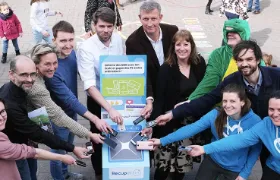Sustainability and economic growth: a constant search for balance
Jim Casteele is Consumer Market Lead at Proximus. As Black Friday and its traditional surge of consumerism draw close, he explains how Proximus continually balances commercial goals and sustainable stakes.
As individuals, citizens and consumers, we face countless choices every day. Do we go for the latest innovation or the lowest price? Do we take the train or the car? Do we consider the ecological impact of our actions or do we focus on our own comfort? Sometimes, all these options go hand in hand, but not always, unfortunately.
Sustainability is increasingly becoming a decisive factor in these choices, and this evolution is reinforced today by the energy crisis felt by all. These are choices that companies also face. The old profit-driven capitalist model has become obsolete: companies that do not invest in sustainable innovations are penalized by both consumers and shareholders. These days, any business venture lacking a concrete sustainable strategy loses all moral credit.
So I consider myself fortunate to work for a company such as Proximus. A company that dedicated one of its strategic pillars to sustainability. A company that recently received, as first BEL20 company and third telecom operator worldwide, the Science-Based Targets Initiative validation for its Net Zero goals. Therefore, in this article, I would like to look into the ways Proximus continuously strives to balance commercial goals and sustainability stakes - even on a day like Black Friday.
Black Friday: a delicate balance
Black Friday is by far the most profitable sales day of the year for many companies, and is also a key moment for Proximus. Consumers are drawn to the big discounts and sometimes indulge in impulsive purchases. Climate activists - quite rightly - point out that blind consumerism has a negative, polluting impact on our world. So wouldn't it be better for companies to stay clear from a day like Black Friday altogether?
That's obviously a valid argument. However, Proximus remains a commercial company operating in the market all year round. Not taking part in a concept like Black Friday would not be consistent with our other endeavors. We are a listed company: in this regard, we run on advertisement and profit, the way we do on the other 364 days of the year. But we strive to do so responsibly. There are mainly two ways to go about it: by helping our customers make better choices, and by investing in sustainable innovations ourselves.
Inform and advise customers
To make educated choices, information is crucial. That's why at Proximus we have set up several initiatives to inform people about the impact of their consumption. For example, customers can use their MyProximus app to compare mobile Internet consumption versus Wi-Fi, or their digital banking app Banx to monitor the CO₂ impact of their banking transactions. We also promote more sustainable options for consumers, such as refurbished smartphones as an alternative to brand new devices. And one of the initiatives of our use-reuse-recycle campaign is to encourage people to turn in their old or broken devices so these can be repaired and resold. If they prove beyond repair, the precious metals they contain can be reused. Another initiative is to explain how a screen protector can make smartphones last longer.
I strongly believe in giving customers options: companies shouldn't try to force their will upon them or dictate what the best choice is. A bit of nudging, however, seems just fine. Using information or providing tips and tricks to encourage the customer to make an "educated" choice. For example, our TV decoders have three modes: medium, low or very low power consumption. The lower the consumption mode, the slower the decoder starts up. Yet we default our decoders to the middle "low" setting.
Why? This minor adjustment can yield annual energy savings of 0.7% for an average household. In other words, a substantial impact well worth a few seconds' wait. The customer still has the option to make a different choice, but with it they are given clear information about the impact of that choice.
Sustainability throughout the chain
In addition to advising and nudging customers, we - as a company - evidently have a responsibility to make sustainable operational adjustments ourselves. In this regard, it is vital to look at the impact of each adjustment throughout the chain. Consider the above-mentioned use-reuse-recycle campaign: besides collecting smartphones, we work together with Umicore to extract the precious metals from used phones so that they can be reused in the production chain.
Another important factor is the way we partner up with producers and suppliers. As a major telecom operator, we can have significant influence over other companies. For instance, we require our partners to also participate in the Net Zero ambition and prepare concrete plans for it. Together with our partners, we look for ways to integrate sustainability into everything we do. Sometimes we even join forces with our competitors: for example, through the CULT partnership in Antwerp, we are working with Telenet and others to make collective sustainable deliveries profitable.
What is the moral of this story? First, sustainability can't be a solo effort. Even as a large company, we have to rely on partnerships. Second, it's an ongoing process, where you constantly have to look for the balance between customer experience, commercial considerations, and sustainability stakes. As such, the perfect balance is an ever-changing ideal that we will probably never reach in practice. But what matters is the constant commitment to do better. And that daily commitment is what motivates me in my work at Proximus.


